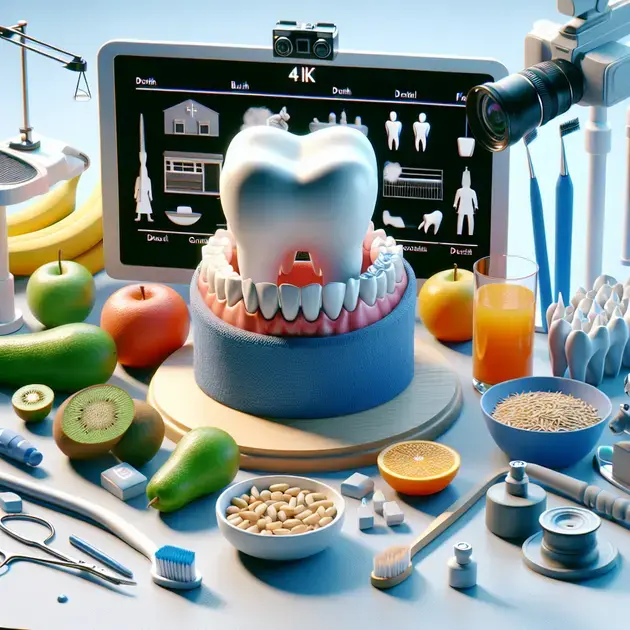When it comes to oral health, understanding how to take care of your gums and teeth is essential. In this comprehensive guide, we will delve into the importance of maintaining good oral hygiene practices to ensure healthy gums and teeth.
Recent studies have shown a strong connection between gum disease and various systemic health conditions, highlighting the significance of proper dental care. By following the tips and recommendations in this guide, you can proactively protect your overall health through a healthy mouth.

Understanding the Importance of Oral Health Maintenance
Oral health maintenance is crucial for overall health and well-being. Poor oral hygiene can lead to various dental issues such as cavities, gum disease, and bad breath. To ensure good oral health, it is essential to follow a proper dental care routine.
Here is a step-by-step guide on how to maintain oral health:
1. Brushing:
Brush your teeth at least twice a day using a fluoride toothpaste. Use a soft-bristled toothbrush and brush in a circular motion to remove plaque and food particles.
2. Flossing:
Don’t forget to floss daily to remove plaque from between your teeth and under the gumline. You can use traditional floss or floss picks for convenience.
3. Mouthwash:
Rinse with an antimicrobial mouthwash to kill bacteria and freshen your breath. Choose a mouthwash that is alcohol-free to avoid drying out your mouth.
4. Regular Dental Check-ups:
Visit your dentist for regular check-ups and professional cleanings. Your dentist can detect any dental issues early and provide appropriate treatment.
5. Healthy Diet:
Eat a balanced diet rich in fruits, vegetables, and lean proteins. Limit sugary and acidic foods and drinks that can contribute to tooth decay.
The Link Between Gum Disease and Overall Health
Gum disease, also known as periodontal disease, is not only harmful to your oral health but can also impact your overall health. Research has shown a connection between gum disease and various systemic conditions such as heart disease, diabetes, and respiratory infections.
Here are some proactive steps you can take to prevent gum disease and maintain your overall health:
1. Proper Oral Hygiene:
Follow a good oral hygiene routine by brushing, flossing, and using mouthwash regularly. This helps prevent the buildup of plaque and bacteria that can lead to gum disease.
2. Healthy Lifestyle Choices:
Avoid smoking and maintain a healthy diet to reduce your risk of gum disease. Smoking weakens the immune system and can make it harder for your body to fight off gum infections.
3. Regular Dental Exams:
Visit your dentist for routine exams and cleanings. Your dentist can monitor the health of your gums and detect any signs of gum disease early on.
4. Manage Stress:
Chronic stress can weaken your immune system and increase inflammation in the body, making you more susceptible to gum disease. Practice stress-reducing activities such as yoga, meditation, or exercise.
5. Stay Hydrated:
Drinking plenty of water helps wash away food particles and bacteria that can contribute to gum disease. Aim to drink adequate water throughout the day to keep your mouth hydrated and healthy.

**Preventing Tooth Decay with Proper Oral Hygiene**
Importance of Oral Hygiene
Good oral hygiene is essential in preventing tooth decay and maintaining overall oral health. By sticking to a regular oral hygiene routine, such as brushing twice a day, flossing daily, and visiting the dentist for regular check-ups, you can significantly reduce the chances of developing cavities and other dental issues.
Proper Brushing Technique
Brushing your teeth using the proper technique is crucial for removing plaque and food particles that can lead to decay. Make sure to brush all surfaces of your teeth, including the back molars, and use a fluoride toothpaste to strengthen enamel.
Benefits of Flossing
Flossing complements brushing by reaching areas between the teeth that a toothbrush can’t. It helps remove plaque and prevents gum disease, which is a common cause of tooth decay. Incorporating flossing into your daily routine is key to maintaining oral hygiene.
Regular Dental Check-ups
Visiting the dentist at least twice a year for routine check-ups and cleanings is essential for preventing tooth decay. A professional dental cleaning can remove plaque and tartar buildup that regular brushing and flossing may miss.
Healthy Diet for Strong Teeth
In addition to proper oral hygiene practices, maintaining a healthy diet plays a crucial role in preventing tooth decay. Foods high in sugar and acid can contribute to the erosion of enamel and increase the risk of cavities. Incorporating nutrient-rich foods such as fruits, vegetables, and dairy products can help strengthen teeth and gums.
Limit Sugary Snacks and Drinks
Reducing the consumption of sugary snacks and beverages is essential for preventing tooth decay. Sugar feeds the bacteria in the mouth, leading to the production of acids that attack tooth enamel. Opt for water or unsweetened tea as healthier alternatives.
Calcium-Rich Foods
Calcium is essential for strong teeth and bones. Incorporate calcium-rich foods such as dairy products, leafy greens, and almonds into your diet to support overall oral health. Cheese, in particular, can help neutralize acids in the mouth and promote enamel remineralization.
Drink Plenty of Water
Water is crucial for maintaining a healthy mouth. It helps rinse away food particles and bacteria that can lead to tooth decay. Drinking fluoridated water can also help strengthen tooth enamel and prevent cavities.
**
Conclusion
**
In conclusion, maintaining proper oral hygiene is crucial for preventing tooth decay and ensuring overall oral health. By establishing a consistent routine that includes brushing twice a day, daily flossing, and regular dental check-ups, individuals can significantly reduce the risk of developing cavities and other dental issues.
Proper brushing techniques, such as brushing all surfaces of the teeth and using fluoride toothpaste, are essential for removing plaque and food particles that can lead to decay. Additionally, flossing plays a vital role in reaching areas between the teeth that a toothbrush may miss, helping to prevent gum disease, a common cause of tooth decay.
Moreover, incorporating a healthy diet rich in nutrient-dense foods like fruits, vegetables, and dairy products can further support strong teeth and gums. Limiting sugary snacks and drinks that contribute to enamel erosion, along with consuming calcium-rich foods for enamel remineralization, are key factors in maintaining optimal oral health.
Ensuring an adequate intake of water is also crucial, as it helps rinse away food particles and bacteria that can lead to decay. Drinking fluoridated water can aid in strengthening tooth enamel and preventing cavities, emphasizing the importance of hydration for a healthy mouth.